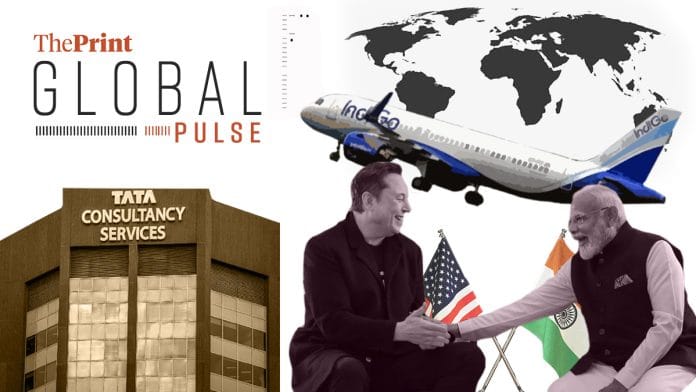New Delhi: India’s biggest IT firm, Tata Consultancy Services, was “gaming” the American immigration system, reports Bloomberg, and former staffers are willing to prove it.
Bloomberg reports that former employees of TCS have filed lawsuits over the firm falsifying organisational charts to make them appear more top-heavy with managers than they really were. The objective was to avoid heightened scrutiny over how TCS was using employment visas.
Three former TCS staffers claim that the company “repeatedly made improper use of special manager-level visas to hire front-line workers who had no management responsibilities”. Known as L-1As, manager visas are easier to obtain than H-1Bs, and don’t have a minimal pay requirement.
One former staffer told Bloomberg, “As Trump took office eight years ago, executives at TCS, an arm of the Indian conglomerate, the Tata Group, were trying to make their organisational charts match their visa applications, before any federal inspectors showed up on their doorstep.”
But the anticipated crackdown didn’t happen during the first Trump administration. “Now, with Elon Musk and other tech executives defending the H-1B program, Trump has changed his rhetoric,” reports Bloomberg. “That flip-flop has triggered pushback from his MAGA base, pitting his nativist supporters against his newer backers from the tech industry.”
TCS is India’s biggest IT firm by revenue. Like many other Indian outsourcers, TCS provides back-office IT services for its customers. But it also needs client-facing workers in the US.
While studies show that immigration has been a net positive for the US economy, Bloomberg points out that the lawsuits suggest “TCS has used L-1A manager visas in ways that echo Trump’s earlier concerns about undercutting American workers”.
“The data, which is previously unreported, shows that the number of L-1A approvals the company has received far exceeds the number of managers it disclosed employing in mandatory federal reports to the US Equal Employment Opportunity Commission. It also shows that TCS, which works with some of the largest US tech companies, has obtained far more manager visas than any other employer in recent years,” the report reads.
It’s unclear how many visas TCS obtained for workers who weren’t really managers. But the data shows that USCIS approved more than 90,000 L-1A visas from October 2019 through September 2023.
“IT outsourcing firms—which contract with US employers to handle information-technology tasks—were the program’s heaviest users, but TCS far outpaced its rivals. The firm received upwards of 6,500 approvals, more than the next seven largest L-1A recipients combined,” Bloomberg writes.
Fabricating job titles is a violation of the Immigration and Nationality Act in the US.
However, in an official statement, TCS has said that it does not comment on ongoing litigation, but “strongly refutes these inaccurate allegations by former employees, which have previously been dismissed by multiple courts”.
“TCS rigorously adheres to all US laws,” the firm said.
The Financial Times reports that India’s biggest airlines—IndiGo—is leaving behind its budget image. The carrier is expanding overseas, aiming to add flights to 40 international destinations by the end of March.
“The move blends its cost-conscious, India-centric focus with newer, fuller-service offerings…setting itself up for fierce competition with global long-haul carriers and departing from its budget roots,” reports FT.
IndiGo, which has been in operation for almost 20 years, has seized over 60 percent of the domestic market. Its horizons are set to broaden even further: IndiGo ordered 30 Airbus long-haul, wide-body planes last year to add to its fleet from 2027.
“IndiGo now has an outstanding order book of about 900 jets with Airbus and is aiming to increase its fleet to about 600 by the end of the decade, doubling it in size from 2023,” reports FT.
“IndiGo’s overseas focus may help defend the airline against the increasing weakness of its home currency. The rupee has fallen to fresh lows against a strengthening dollar and resulted in an 18 percent year-on-year decline in the carrier’s profit after tax in the quarter through December, even though it reported a record 31 million customers had flown with it during the period.”
In other news, Bloomberg reports that Tesla is hiring in India—a “sure sign” that it plans to enter the market—just days after CEO Musk met Prime Minister Narendra Modi in the US.
Tesla is hiring for 13 roles, according to its LinkedIn page. “At least five of the positions, including service technician and various advisory roles, were available in both Mumbai and Delhi, while the rest of the openings, such as customer engagement manager and delivery operations specialist, were for Mumbai,” reports Bloomberg.
Tesla and India have been engaged in a cat-and-mouse game for years, with Tesla ultimately staying away over concerns on high import duties. Now, India has reduced the basic customs duty of high-end cars priced above $40,000 to 70 percent from 110 percent.
“While India’s EV market is still nascent compared to China’s, it offers an avenue for Tesla to check slowing sales after it posted its first annual drop in EV sales in over a decade,” reports Bloomberg. “India’s electric car sales neared 100,000 units last year compared to China’s 11 million.”
Also Read: India an ‘unexpected’ role model for Europe & inside Maha Kumbh’s lost & found centre






